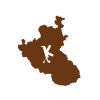Chaavu Paat
Chaavu Paat is the song sung on the funeral day and is unique type of kodava paats
Author of this article
Kaibulira Devaiah
Source
Extracted from the folk lore ballad
About
The Kodava funeral song is sung on the funeral day by four villagers or relatives . These four singers sit beside the dead body . In the olden days it is said that both men and women used to sing Chaav Paat , 4 men used to sing for a while and 4 women for a while until the dead body is taken out for cremation . Gradually through the years women Chaav Paat singers have become non existent . The uniqueness of Chaav Paat is that unlike most of other Kodava folk songs , Chaav Paat doesn’t use Kodavas’ traditional drum (Dhudi) or cymbals (Thaala) . The song is very lengthy and also can be shortened if the cremation is going to take place early . The song lyrics is the conversation between the singers and the soul of the dead body . Depending upon the relation between the singers and the dead person , the singers uses the title as “Ajjayya ” “Avvayya” “Akkayya” “Baavayya” “Annayya” “Thangavva” at the end of the each line of the song . The song starts with explaining the present grieving situation of the sorrowful house with poetical analogies . Then song moves on to talk about the birth , childhood, adulthood , marriage , hardwork in paddy fields , raising children and so on of the dead person. The song ends by explaining how the person contracted disease , the last minute struggle of the family members to save the person by arranging herbal medicine , seeking help at temple , slaughtering Pig , Chicken as offerings to deities and so on .
The song is most pathetic and touches a kindred chord in every sorrowing heart-
Chaav Paat .
Kettiro Ajjaiah ninga
Kett-nanake kett-le Ajjaiah
Kettpoana keuh-de Ajjaiah
Chothiro Ajjaiah ninga
Chothanake chothle Ajjaiah
Baddhiro Ajjaiah ninga
Baava kaala baddhiro Ajjaiah
Baavak kodhchiro Ajjaiah
Chaavak madchiro Ajjaiah
Baava kodhi yethle Ajjaiah
Chaava ke-uhd yethcho Ajjaiah
Kaala poi bappadho Ajjaiah
Kaalathode baathala Ajjaiah
Narayana Dhevando Ajjaiah
Itta padi thengcho Ajjaiah
Meley padi ittlé Ajjaiah
Ael thorey Pommaale Ajjaiah
Maaley choorey budhdhole Ajjaiah
Ninga choorey buddhiro Ajjaiah
Notvala kannadiyo Ajjaiah
Kai thappi nela thaandh Ajjaiah
Budh-odandh poanole Ajjaiah
Ninga-odandh poiro Ajjaiah
Pollvala ponjoodh Ajjaiah
Paadha thundi poanole Ajjaiah
Ninga thundi poiro Ajjaiah
Thith maley pojjadho Ajjaiah
Naan-aranji kondle Ajjaiah
Naan-aranji kondino Ajjaiah
Nee booki kedthippo Ajjaiah
Kalla pade bandhadho Ajjaiah
Naan-aranji kondle Ajjaiah
Naan-aranji kondino Ajjaiah
Keththi choorey ittipo Ajjaiah
Kettiro Ajjaiah ninga
Ninga ketta ke-uhde Ajjaiah
Kaaala-allatha kaalatho Ajjaiah
Thinga-allatha thingatho Ajjaiah
Kumbiyar thingatho Ajjaiah
Iggtha maley mol-l Ajjaiah
Thith bedh kaanjith Ajjaiah
Nellige chedanjith Ajjaiah
Nei pillkh thithaai Ajjaiah
Pill choorey budhdhole Ajjaiah
Eee Okkada kundhl Ajjaiah
Ninga choorey buddhiro Ajjaiah
Chaav Paat meaning
Woe, my father, then art gone,
Woe is me, For ever gone,
Gone with all thy soul of virtue,
Oh, how can I live my father,
Woe, thy days are now concluded,
And the share, assigned to thee
By the Lord, is now consumed
And no further portion granted.
Oh, they wish was not to die,
But to stay among the living
Surely, man came to this world
But to die; not one of us
Is exempted from this doom
Onward, onward roll the years;
Oh, how soon were thine concluded:
Like the eagle in the sky
Thou vast roaming here on earth
Woe, the string of choicest pearls
Round the neck of our children
Is forever burst and scattered,
Woe, the clear and brilliant mirror,
Fallen out of our hand,
Fallen to the ground, and broken,
Woe, the wrath of God Almighty,
Floods of fiery indignation,
Beating on the lefty mountains,
Swept their summit to the ground,
Like the enemies at night,
Breaking into peaceful houses,
Slaying all the valiant men,
Even thus has God Almighty
Suddenly cut off thy days.
Like the top of Tumbemale
In the sultry days of summer,
When the sun is not and burning,
And the grass is set on fire,
Thus, O father, was this house
Desolated by thy death,
As the raging storms in June
Break the fruitful plantain trees
In the garden round our house,
Thus vast thou cut off, O father,
When the floods destroy the shed,
Where the stores of wood were sheltered,
All the house is in distress.
When the meeting hall is ruined,
All the villagers lament.
If the temple is destroyed,
All the land is full of sorrow.
Thus is our house distressed
By thy sudden death, O father,
As they quench the shining flame
Of the beauteous golden lamp,
Thus has God destroyed thy life,
As the stately Banyan tree
In the lofty mountain forest,
Which the ax has never touched,
Is uprooted by the whirlwind ;
Like the bright and shining leaf
Of the royal Sampige,
Broken from the stem and withered;
Thus wast thou cut off, O father,
In the days of life thy hand
Had supported our house,
Thou hast planted our fields,
Thou hast laid the corner-stone,
And completed our mansion
To the roof, with costly timber
Thou hast built the solid gate,
And the courts around the house
Oh, my father; yesterday
Fallen on the bed of sickness,
And to-day before the feet
Of the Lord of earth and heaven,
And tomorrow, like the sun
Setting in the cloudy sky,
Thou shall sink into the grave.
Woe, my father, thou art gone,
Woe, my father, gone for ever
Song
Yet to recieve


Comments
Leave a comment!Login for Post Comment
Last posts